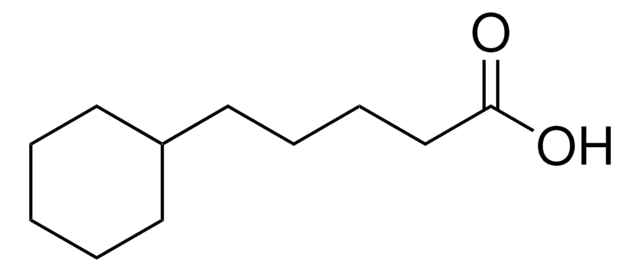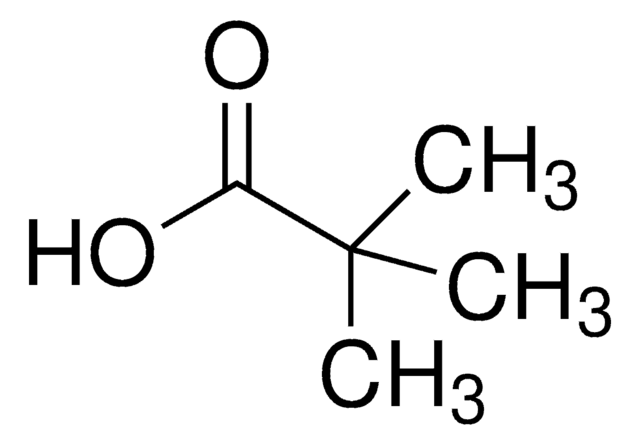333840
Dicyclohexylacetic acid
99%
Se connecterpour consulter vos tarifs contractuels et ceux de votre entreprise/organisme
About This Item
Formule linéaire :
(C6H11)2CHCO2H
Numéro CAS:
Poids moléculaire :
224.34
Numéro MDL:
Code UNSPSC :
12352100
ID de substance PubChem :
Nomenclature NACRES :
NA.22
Produits recommandés
Pureté
99%
Forme
solid
Pf
139-141 °C (lit.)
Groupe fonctionnel
carboxylic acid
Chaîne SMILES
OC(=O)C(C1CCCCC1)C2CCCCC2
InChI
1S/C14H24O2/c15-14(16)13(11-7-3-1-4-8-11)12-9-5-2-6-10-12/h11-13H,1-10H2,(H,15,16)
Clé InChI
PGGMEZOUAPIYOY-UHFFFAOYSA-N
Application
Dicyclohexylacetic acid was used in the synthesis of 2,2-dicyclohexyl-1-(4′-methyl)-phenylethanone. It was also used in the synthesis of catena-poly [[trimethyltin (IV)]--2, 2-dicyclohexylacetato-2O: O′].
Mention d'avertissement
Warning
Mentions de danger
Conseils de prudence
Classification des risques
Eye Irrit. 2 - Skin Irrit. 2 - STOT SE 3
Organes cibles
Respiratory system
Code de la classe de stockage
11 - Combustible Solids
Classe de danger pour l'eau (WGK)
WGK 3
Point d'éclair (°F)
Not applicable
Point d'éclair (°C)
Not applicable
Équipement de protection individuelle
dust mask type N95 (US), Eyeshields, Gloves
Faites votre choix parmi les versions les plus récentes :
Déjà en possession de ce produit ?
Retrouvez la documentation relative aux produits que vous avez récemment achetés dans la Bibliothèque de documents.
Les clients ont également consulté
catena-Poly [[trimethyltin (IV)]--2, 2-dicyclohexylacetato-2O: O′].
Cheikh AKD, et al.
Acta Crystallographica Section E, Structure Reports Online, 63(1), m258-m260 (2006)
Excited precursor reactivity, fast 1, 2-H shifts, and diffusion-controlled methanol insertion in 1, 2-Diphenylalkylidenes.
Motschiedler K, et al.
The Journal of Organic Chemistry, 64(14), 5139-5147 (1999)
Mohamed H Mohamed et al.
Journal of colloid and interface science, 395, 104-110 (2013-02-05)
Tensiometry was used to provide estimates of the critical micelle concentration (cmc) values for three sources of naphthenic acids (NAs) and three examples of single component NAs (S1-S3) in aqueous solution at pH 10.5 and 295 K. Two commercially available
Mette Kristensen et al.
Journal of chromatography. A, 1601, 21-26 (2019-05-13)
Gas-chromatography (GC) analysis of carboxylic acids is limited by the high polarity and low volatility of most of these compounds. Boron trifluoride (BF3) mediated alkylation reactions is one of the most commonly used derivatization methods for making carboxylic acids GC
Dieter Schemeth et al.
Analytica chimica acta, 1038, 182-190 (2018-10-04)
In this study, we focus on isolation and fractionation strategies by solid phase extraction (SPE) for a broad range of environmentally related organic acids. These emerging potential contaminants are primary degradation products of spilled petrogenic compounds but little attention has
Notre équipe de scientifiques dispose d'une expérience dans tous les secteurs de la recherche, notamment en sciences de la vie, science des matériaux, synthèse chimique, chromatographie, analyse et dans de nombreux autres domaines..
Contacter notre Service technique












